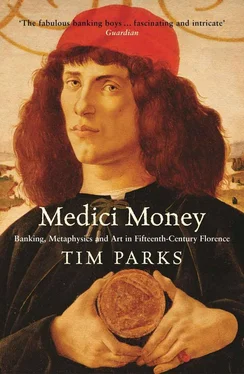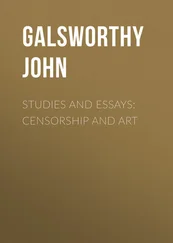TO HAVE A proper understanding of Cosimo’s management of the Medici bank, one must study the 600 densely detailed pages of Raymond de Roover’s The Rise and Decline of the Medici Bank . To gain a thorough grasp of the way Cosimo ran Florence while apparently retaining the role of an ordinary citizen, one must settle down for at least a week with the 450 pages and labyrinthine complications of Nicolai Rubinstein’s The Government of Florence Under the Medici . To have just some inkling of the ambiguity of Cosimo’s relationships with the Christian faith and humanism, the contradictory impulses driving his commissions of so many buildings and works of art, one must tackle Dale Kent’s exhaustive and quite exhausting Cosimo de’ Medici and the Florentine Renaissance .
These books rarely communicate with each other. Sometimes you might be reading about three different, equally remarkable careers. Yet whichever side of Cosimo you are looking at, you are always aware of this fatherly man’s special genius for holding things in check . What exactly? The destructive energies generated by the collision of irreconcilable forces: faction and community, Milan and Naples, commercial appetite and Christian morals, the love of liberty and the need for order. To hold the fort — the bank, the family, the state — in the midst of chaos, you must reconcile the irreconcilable. How? The language rebels. In the short term, is the answer, with the aid of considerable sums of money, a genius for ad hoc solutions, and the utmost discretion. Only a banker could have done it. When the money runs out, or is used without tact, your time is up.
In 1442, in his early fifties, Cosimo was the main supporter behind the formation of a new religious confraternity: the Good Men of San Martino. The idea was to help the “shamed” poor, those who had fallen on hard times but were too proud to ask for charity. The Good Men went around the town asking for donations, after which they brought relief and preserved anonymity. Fifty percent of monies collected were registered as coming from the Medici bank. The contribution is entered in the bank’s books under the heading: God’s Account.
The arrangement is emblematic of the way Cosimo works. A largesse with political implications is hidden behind a religious organization and the name of a commercial company. The amount of money felt to be coming from oneself is doubled by also having donations collected from others. The sense of guilt arising from sinful lending operations and constant tax evasion is attenuated. The danger of economic unrest in the town is reduced. By not asking for recognition or imposing yourself as benefactor, you actually attract even greater recognition. Most crucial of all to the scheme’s success, however, was a genuine charitable impulse. “The poor man is never able to do good works,” Cosimo wrote thoughtfully to his cousin Averardo. The poor get to heaven, wrote Archbishop Antonino, by bearing their tribulations with fortitude, the rich by giving generously to the poor. Such is the providence of social inequality. A Christmas or Easter handout of wine and meat distributed by the Good Men of San Martino cost Cosimo 500 florins, three bank managers’ annual salaries.
BUT SUCH SUMS were nothing compared to the cost of that greatest irreconcilable of them all: How could an international merchant bank function when most European trade was going only one way — from the Mediterranean northward — a situation exacerbated by the fact that Rome was drawing huge sums toward itself in Church tributes without even giving anything in return? Had the pope, the Curia, been based in Paris or Bruges or London, how easy everything would have been! Italy could have sent silk and spices north, then used at least part of the income in situ to pay its dues to the Church. Not too much cash need have been moved. But the opposite was the case. The Italian bank had to recover not only the payment for products sent north but also the papal dues that it was responsible for collecting. This in a world where to move money in coin was extremely dangerous. Much of the territorial expansion of the Medici bank was undertaken to deal with this chronic imbalance. The upheavals that led to the bank’s eventual collapse stemmed in large part from the growing desperation of the measures used.
In 1429 it was decided that the Rome branch would operate without capital . Deposits from clergy, together with what coin did arrive, would be sufficient. Other monies due to the Curia from abroad would provide the capital for other branches. This move freed up perhaps twenty or thirty thousand florins. Not a solution.
Inevitably, the debt of the bank’s northern operations toward its Rome branch grew. They couldn’t find ways to send the monies they owed. This was not too worrying when the operation in question was another Medici branch, but it was dangerous when the organization holding the money was an independent agent operating on the bank’s behalf. In the first decade of the century, the Medici had established relations with such agents in London and Bruges. These were other Italian banks that collected papal dues and sold luxury merchandise for the Medici bank. They were under instructions to seek out quality wool to send back to Italy (and the Medici factories) in order to balance the flow and make the return trip worthwhile for the galleys that had brought Italian products north. The banks thus aimed to create the trade that they had come into being to assist and exploit.
But there was a problem. The English now wanted to work all their wool themselves and imposed severe export restrictions and exorbitant duties. The flow did not balance and never would. In 1427, Ubertino de’ Bardi in London and Gualterotto de’ Bardi in Bruges owed the Medici bank the huge sum of 22,000 florins, most of it due to the Rome branch. Those Bardi! Did their slowness in paying really have to do with problems finding merchandise or letters of credit going south? After all, holding someone else’s cash interest-free is always convenient. Was there some connivance, perhaps, between Ubertino de’ Bardi, a free agent in London, and his brother Bartolomeo de’ Bardi, the Medici director in Rome? Not to mention the Medici’s general manager, Ilarione di Lippaccio de’ Bardi, in Florence. This couldn’t go on. At some point, the Medici bank would have to form its own branches in both Bruges and London, if only to invest the income that couldn’t easily find its way back to Italy.
ON RETURNING TO Florence from exile in 1434, Cosimo cut all the Bardi family out of his extensive operations. A clean sweep. What had they done in his absence? We don’t know. The richest Bardi, related by marriage to Palla Strozzi and working for Cosimo’s cousin Averardo’s bank, was exiled. The man was dangerous. Averardo himself had died in exile. Bringing families together in complex relationships might make for strength, but it could also create the conditions for conspiracy and betrayal. Here was another balance that would have to be struck and restruck, year in and year out. What Cosimo’s Bardi wife thought about it, we do not know.
The Portinari family now took the place of the Bardi. Running the Venice branch, Giovanni Portinari was one of the most important men in the organization. Still nervous about the political situation in Florence, Cosimo had shifted much of the home bank’s capital to Venice. In 1431, Giovanni’s brother, Folco, running the Florence branch, had died, leaving seven children. Cosimo took three boys into his own family: Pigello aged ten, Accerito aged four, and Tommaso aged three. All would eventually hold key positions in the Medici bank.
Was this what Cosimo, who only had two children of his own — two legitimate children — planned? That the Portinari boys, brought up in his home, would be more indebted to him, better servants of the bank than any Bardi could be? If so, it was an error. Nothing is less certain than the gratitude of those who have seen us in the role of father, those who have sensed, perhaps, that the real sons are being preferred. There was some question as to whether the Portinari boys had received all the money they should have when their real father died. Folco had had considerable investments in the Medici bank.
Читать дальше












